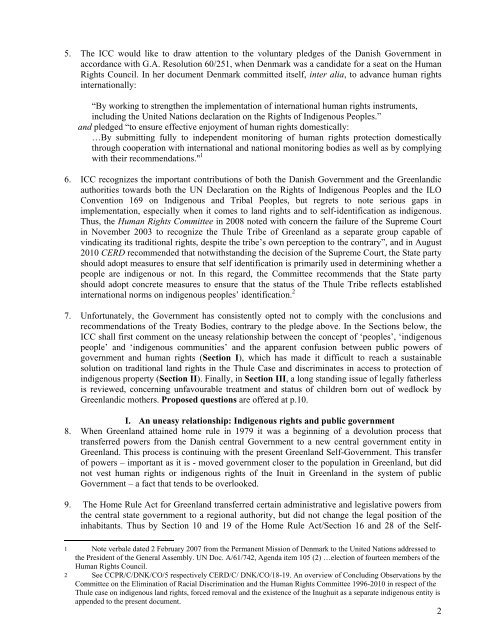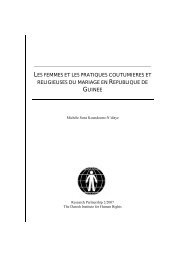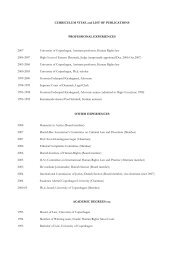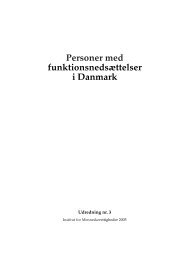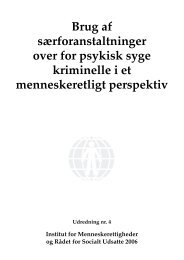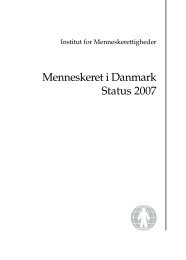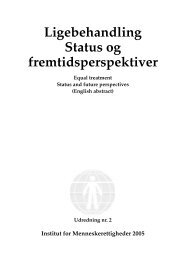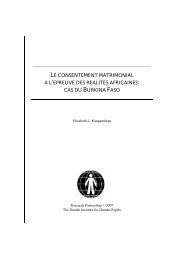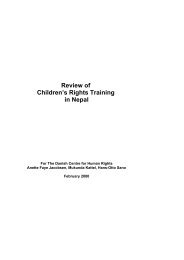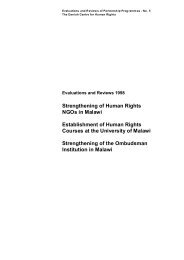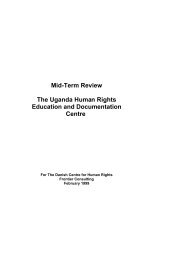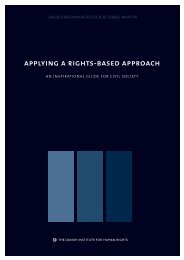JS2 – Joint report 2 (pdf) - Danish Institute for Human Rights
JS2 – Joint report 2 (pdf) - Danish Institute for Human Rights
JS2 – Joint report 2 (pdf) - Danish Institute for Human Rights
Create successful ePaper yourself
Turn your PDF publications into a flip-book with our unique Google optimized e-Paper software.
5. The ICC would like to draw attention to the voluntary pledges of the <strong>Danish</strong> Government in<br />
accordance with G.A. Resolution 60/251, when Denmark was a candidate <strong>for</strong> a seat on the <strong>Human</strong><br />
<strong>Rights</strong> Council. In her document Denmark committed itself, inter alia, to advance human rights<br />
internationally:<br />
“By working to strengthen the implementation of international human rights instruments,<br />
including the United Nations declaration on the <strong>Rights</strong> of Indigenous Peoples.”<br />
and pledged “to ensure effective enjoyment of human rights domestically:<br />
…By submitting fully to independent monitoring of human rights protection domestically<br />
through cooperation with international and national monitoring bodies as well as by complying<br />
with their recommendations." 1<br />
6. ICC recognizes the important contributions of both the <strong>Danish</strong> Government and the Greenlandic<br />
authorities towards both the UN Declaration on the <strong>Rights</strong> of Indigenous Peoples and the ILO<br />
Convention 169 on Indigenous and Tribal Peoples, but regrets to note serious gaps in<br />
implementation, especially when it comes to land rights and to self-identification as indigenous.<br />
Thus, the <strong>Human</strong> <strong>Rights</strong> Committee in 2008 noted with concern the failure of the Supreme Court<br />
in November 2003 to recognize the Thule Tribe of Greenland as a separate group capable of<br />
vindicating its traditional rights, despite the tribe’s own perception to the contrary”, and in August<br />
2010 CERD recommended that notwithstanding the decision of the Supreme Court, the State party<br />
should adopt measures to ensure that self identification is primarily used in determining whether a<br />
people are indigenous or not. In this regard, the Committee recommends that the State party<br />
should adopt concrete measures to ensure that the status of the Thule Tribe reflects established<br />
international norms on indigenous peoples’ identification. 2<br />
7. Un<strong>for</strong>tunately, the Government has consistently opted not to comply with the conclusions and<br />
recommendations of the Treaty Bodies, contrary to the pledge above. In the Sections below, the<br />
ICC shall first comment on the uneasy relationship between the concept of ‘peoples’, ‘indigenous<br />
people’ and ‘indigenous communities’ and the apparent confusion between public powers of<br />
government and human rights (Section I), which has made it difficult to reach a sustainable<br />
solution on traditional land rights in the Thule Case and discriminates in access to protection of<br />
indigenous property (Section II). Finally, in Section III, a long standing issue of legally fatherless<br />
is reviewed, concerning unfavourable treatment and status of children born out of wedlock by<br />
Greenlandic mothers. Proposed questions are offered at p.10.<br />
I. An uneasy relationship: Indigenous rights and public government<br />
8. When Greenland attained home rule in 1979 it was a beginning of a devolution process that<br />
transferred powers from the <strong>Danish</strong> central Government to a new central government entity in<br />
Greenland. This process is continuing with the present Greenland Self-Government. This transfer<br />
of powers <strong>–</strong> important as it is - moved government closer to the population in Greenland, but did<br />
not vest human rights or indigenous rights of the Inuit in Greenland in the system of public<br />
Government <strong>–</strong> a fact that tends to be overlooked.<br />
9. The Home Rule Act <strong>for</strong> Greenland transferred certain administrative and legislative powers from<br />
the central state government to a regional authority, but did not change the legal position of the<br />
inhabitants. Thus by Section 10 and 19 of the Home Rule Act/Section 16 and 28 of the Self-<br />
1 Note verbale dated 2 February 2007 from the Permanent Mission of Denmark to the United Nations addressed to<br />
the President of the General Assembly. UN Doc. A/61/742, Agenda item 105 (2) …election of fourteen members of the<br />
<strong>Human</strong> <strong>Rights</strong> Council.<br />
2 See CCPR/C/DNK/CO/5 respectively CERD/C/ DNK/CO/18-19. An overview of Concluding Observations by the<br />
Committee on the Elimination of Racial Discrimination and the <strong>Human</strong> <strong>Rights</strong> Committee 1996-2010 in respect of the<br />
Thule case on indigenous land rights, <strong>for</strong>ced removal and the existence of the Inughuit as a separate indigenous entity is<br />
appended to the present document.<br />
2


